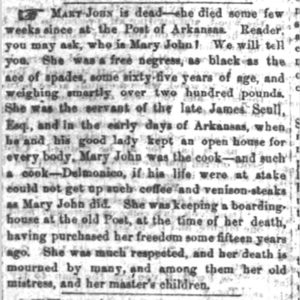calsfoundation@cals.org
Mary John (?–1857)
Mary John was born a slave under French colonial occupation, and after obtaining her freedom in 1840, she opened a hotel at Arkansas Post and became a prominent local figure.
Mary John was born around the latter part of the 1780s. She may have been Marie Jeanne, whom Etienne de Vaugine bequeathed to his granddaughter, Pelagie, in his will dated September 1, 1794, at New Orleans, Louisiana (although the 1850 federal census lists her as having been born in Arkansas). Little is known about her early life. A bill of sale written in French by notary Andre Fagot at Arkansas Post on July 30, 1806, records that Marie Languedoc transferred ownership of a “creole negress” named Marie Jeanne to Jean Larquier “for the price and sum of eight hundred piasters.” Five years later, Marie, “free from all mortgage,” was sold to James Scull, a prominent American settler at Arkansas Post, for the same amount of Larquier’s original purchase.
During the time she was owned by James Scull, her name was changed to Mary John, which afforded both a first name and a surname acceptable to contemporary American record keepers. For the next thirty years, Mary John worked as a slave while also laboring for her own benefit, until she was able to save enough money to purchase her own freedom from Scull, which she did on September 13, 1840, for the amount of $800. The record documenting this transaction described Mary John as “a negro woman about fifty years old.”
In 1846, after convincing T. Farrily and Lewis Refeld, two white men, to serve as her legal guardians, Mary John opened a tavern/hotel at Arkansas Post. Her business became quite successful, as she had already established a reputation years before as an able cook. Judge J. W. Bocage wrote of an 1840 Independence Day celebration in Arkansas Post that Mary John’s “splendid dinners at the post of Arkansas, will never be forgotten.” W. H. Halliburton, a local contemporary of Mary John’s, wrote in his history of the county, “An old free negro named Mary John kept here, the only hotel or public house in the county, which was perhaps, the most celebrated in the State for the perfection of its cuisine.” Goodspeed’s Biographical and Historical Memoirs of Central Arkansas later recollected that Mary John’s was one of only “three famed hostelries on the Arkansas River in the olden times,” the others being Nick Peay’s at Little Rock (Pulaski County) and James L. Buck’s at Pine Bluff (Jefferson County).
Enumerated in the 1850 federal census as the head of household No. 49 in Arkansas Township, Arkansas County, is Marie Jean, a black woman, sixty-two years old, born in Arkansas.
On May 18, 1857, William Refeld was appointed administrator of the estate of Mary John, who died intestate earlier that month. He apparently came into possession of her tavern, for in the 1860 federal census, Refeld is listed as the “Hotel Keeper” at Arkansas Post.
It is difficult to obtain greater insight into the lifestyle and holdings of a black businesswoman in Arkansas County in the 1850s due to the absence of the inventory, appraisement, or estate sale records. Neither is it noted if Mary John was survived by legal heirs. There are no widely known sources on Mary John—just a few lines here and there among various documents. Even her obituary is vague and was written weeks after her death.
For additional information:
“Mary John is Dead.” Arkansas Gazette, June 6, 1857, p. 2.
“Vaugine Arkansas Connections.” Grand Prairie County Historical Bulletin (April 1978): 6–24.
Dyan Bohnert
Grand Prairie Historical Society
 African Americans
African Americans Business, Commerce, and Industry
Business, Commerce, and Industry European Exploration and Settlement, 1541 through 1802
European Exploration and Settlement, 1541 through 1802 Food and Foodways
Food and Foodways Women
Women Mary John Death Notice
Mary John Death Notice 




Comments
No comments on this entry yet.